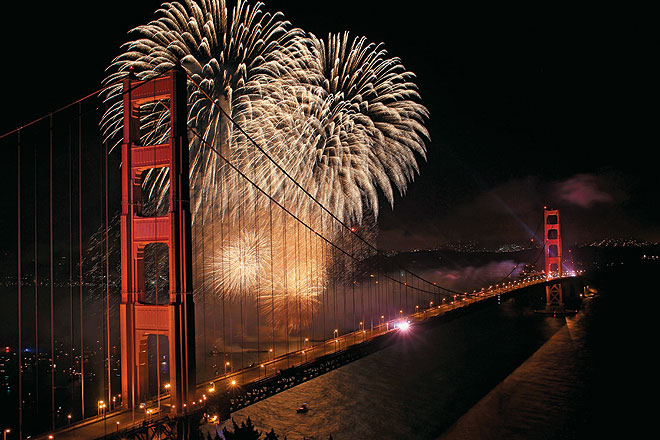When it turned fifty, the Golden Gate Bridge received a special birthday gift: no vehicular traffic for
The Golden Gate survived the celebration but a lesson was learnt. So, on May 27, 2012, when it celebrated its seventy-fifth anniversary, much of the celebrations were held off the superstructure. The occasion was marked by concerts, fog-proof fireworks, souvenirs, family picnics and the presence of thousands at the nearby flower-strewn Chrissy Field, from where the orange bulk of San Francisco’s most identifiable landmark appears evocatively like a large drawing-room canvas.
That the Golden Gate — eulogised in countless Hollywood films, documentaries, T-shirts, coffee mugs, in verses and as topper in multiple ‘World’s Most Beautiful Bridge’ polls — is a great survivor, makes its life’s narrative seem as human as Sourav Ganguly’s or for local flavour, Jerry Garcia’s.
For one, the bridge would have been stillborn had the US government’s War Department not relented and agreed to its construction during the World War years. And during the Great Depression, when funds dried up for the $35-million bridge, residents of San Francisco put in a lien for it against personal property bonds. Sure, it connected the dots of San Francisco within minutes with Sausalito across the Bay, but how often do citizens stake their all for a bridge? In those pre-construction years, the residents played another important role when they boycotted the ferries of the Southern Pacific Railroad Company who had filed close to 2,300 legal cases against the construction of the bridge. When it was thrown open on May 27, 1937, as a Pedestrian Day, when the first people walked, ran, bicycled and roller-skated across, the Golden Gate (preceding the Baby Boomer years by some) became truly a San Franciscan baby.
Located between two seismic faultlines, it has stood through two large earthquakes and survived a schizophrenic post-9/11 world when a sense of vulnerability visited most iconic structures in America. It’s still under the high-risk orange-alert grade by the police.
But, in its seventy-fifth year, it stood as a talisman to the American zest for life. Every weekend, families carried their chair-table to the grounds below it, concerts were held under its shadow and a hike across it was more than a mere touristy privilege.
Having on previous occasions walked and driven across the bridge, on my recent visit, I decide to ‘bike the bridge’. I’m joined by Glen Walton, an amiable Australian now part of the Bay Area’s illustrious IT industry. We chat while we pedal but both activities become increasingly difficult with every sharp incline leading to the bridge. It’s a usual Saturday morning, suffused by the celebratory cheer of locals and tourists, young and old on skates, bikes or on foot.
The Golden Gate, though, is as elusive as ever. The dense fog rising from the Pacific waters keeping it under wraps, opening up occasionally to reveal portions of its international orange-coloured contours. Going up the last few inclines, my muscles scream riot. The mental note I made earlier to ferry back from Sausalito to San Francisco for the experience of skirting the bridge and the Alcatraz prison now seems wise.
On the bridge, something mollifies the mind and muscles. With the draft of cold wind blowing in from the mouth of the Pacific on the right and the mist-sprayed outlines of San Francisco sprawled out on the left, it feels exhilarating to have made it up there. I look up. The top of the steel tower — each weighing a mammoth 22,000 tonnes and one of the reasons why the bridge built over the swirling ocean is considered an engineering marvel — is still fogged over.
But at least now, I’m right in the middle of the picture postcard with the wind on my face. And the sleek lines of the bridge that blend in so well with the surrounding landscape, echoing San Francisco’s famed aesthetic spirit, can now be touched.
Also visit the new visitor centre (goldengatebridge75.org)
Hollywood
San Francisco
Leave a Reply
You must be logged in to post a comment.


